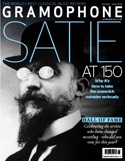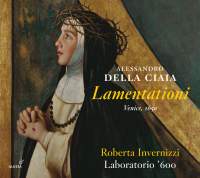Texte paru dans: / Appeared in: |
|
|
Outil de traduction (Très approximatif) |
|
|
Reviewer:
David Vickers
Even diligent Italian Baroque specialists won’t know much about Alessandro Della Ciaia (c1605-c1670), an aristocrat in mid-17th-century Siena reputed to have been a fine singer, harpsichordist and lutenist. His publication Lamentationi sagre (Venice, 1650) contains an afterpiece that reveals these sets of monodic Lamentations – three each for the Tenebrae services at dusk on Maundy Thursday, Good Friday and Holy Saturday – were composed as a favour for Sienese nuns rather than ‘for professional reasons or out of ambition’.
One cannot help
wondering if the actual manner of accompaniments played by Sienese nuns 400
years ago would have been quite as intricately layered and carefully contrived
as the rich palette of continuo instruments (double harp, archlute, theorbo and
organ) conjured up by Laboratorio ’600. Likewise, at times Roberta Invernizzi’s
smouldering and dynamically charged singing seems closer to the feistiness of
the theatre than the piety of the convent. Naturally, these engrossing qualities
are perfectly in accordance with our modern expectations of firm engagement and
technical finesse – and Invernizzi’s declamatory authority and flexible
articulation are well-suited to emotive vocal parts that require mastery of a
two-octave range. Spinning melismatic features are delivered with animated
passion, such as the elongated musical expressions of the Hebrew letters that
introduce each Lesson. There are potent descriptive features such as chromatic
dissonances to illustrate the inconsolable line ‘come and see if there is any
suffering like my suffering’ in the Third Lesson from Maundy Thursday. There is
increased musical intensity in vivid passages that describe Jehovah’s
destruction of the walls and gates of Zion (in the First Lesson for Good Friday)
and the turbulent scorch of famine (the oration for Holy Saturday).
|
|
|
|
|
|
Cliquez l'un ou l'autre
bouton pour découvrir bien d'autres critiques de CD |
|




